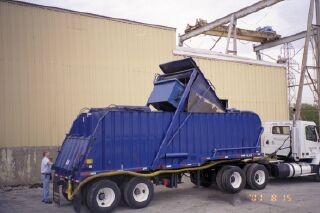Working with Law Enforcement to Fight Back
A recent statement from U.S. Attorney Robert Higdon, Jr., who is involved with some higher-profile grease theft cases, notes that the rendering industry loses between $45 million and $75 million in cooking oil theft each year. This is not an insignificant crime.
That’s why we’ve made a substantial investment in employing our own security team, strategically placed around the country.
This team is comprised of highly experienced, former law enforcement professionals, many of whom have backgrounds in narcotics, corruption or capital murder cases. They work with federal, state and local law enforcement agencies, as well as prosecutors, to not only make them aware of the problem and assign a monetary value to the stolen cooking oil, but often, to physically assist with the investigation.
“We realize that law enforcement organizations are stretched thin as it is, and there are a lot of other crimes—rightfully so—that have a higher priority than grease theft. But, as our security team can attest, more times than not, the individuals and groups that are stealing the used cooking oil are often associated with other serious crimes,” Todd Mathes, Senior Vice President of Procurement for Darling Ingredients, said. “I think more and more, local law enforcement officials are seeing that link—and recognizing that we’re not talking about petty theft here, or a kid who is down on his luck and makes a bad choice. Grease theft is a serious business, involving people they want to get off the street.”
Take, for example, the four-state operation that recruited methamphetamine addicts while they were in prison, gave them trucks when they were released, and taught them how to steal grease. The Darling security team documented the scale of the problem, which not only attracted the attention of law enforcement but also, the Internal Revenue Service. After a long undercover operation, law enforcement was able to indict and incarcerate the masterminds of the organization, which effectively shut it down.
A lengthy surveillance operation by Darling investigators also documented thefts of more than 66,000 pounds of used cooking oil by one operation over a three-month period. The goods went to an illegal transfer station on a hilltop property, where the grease runoff from the operation contaminated nearby properties. Eventually, the thieves were caught and the illegal activity was stopped.
Most recently, the combined efforts of Homeland Security and the support of Darling’s security team lead to the indictment of 21 individuals on multiple charges. The group has been charged with stealing used cooking oil in North Carolina, Virginia and Tennessee valued at $3.4 million, and transporting it to New Jersey for sale and distribution. According to John Eisert, Acting Special Agent with Homeland Security in Charlotte, NC, these co-conspirators had an elaborate scheme to steal thousands of gallons of cooking oil for their own profit[1].
But, the grease theft charges were just the beginning.
These individuals were also charged with conspiracy and money laundering. If convicted, they face a maximum of 25 years in prison, a $500,000 fine, and a term of supervised release.
At the time of this writing, the court date for these indictments is pending.
These are only a few of the hundreds of criminals that the Darling security team has helped law enforcement bring to justice.
“So many of these successes, like the latest arrests involving Homeland Security, have been triggered by a member of our security team giving a presentation to restaurant owners, community leaders or law enforcement to educate them on the ramifications of grease theft,” Mathes said.
The Impact on Communities, the Environment and Human Health
While it’s easy to see the detrimental effect grease theft has on restaurants, legitimate rendering companies and biofuel manufacturers, does it really make that big of an impact on the rest of us?
According to Mathes, the answer is, “absolutely yes.”
“In most cases, you have people who aren’t licensed to drive heavy equipment on the road. Our security team has seen cases where they flip the vehicles, damage restaurants, and leave a grease spill in the store’s parking area or on the roadways, which can cause accidents the morning after,” he said. “There’s always the issue of personal safety.”
Thieves are stealing from restaurants that cater to family dining, and where teenagers often land their first jobs. Spilled grease can be a physical threat, but so could unexpected confrontations with thieves caught in the act. Customer and employee safety should be a concern of every restaurant manager.
“Grease thieves almost always have ties to other criminal activity. They aren’t the kind of people you want in your neighborhood or by your school or business,” said Mathes. “Our company works diligently to make store owners and local law enforcement aware of this threat to public safety.”
Equally concerning is the environmental impact, and the potential damage to the potable water supply.
“Grease processing is actually very technical and expensive. The used cooking oil is heated, separated, and run through centrifuges—then, the water has to be treated in compliance with the wastewater requirements, before it goes back into the water supply. We’ve invested heavily in our plants so that we are able to do this in accordance with all environmental regulations,” Mathes explained. “I can tell you that the thieves or the buyers of stolen grease have not made this investment. They might have a backyard grease settling facility where they heat the used cooking oil up a little, and let the water and grease separate. Then, they take the grease off the top of the water and sell that.”
The water, as is, goes back into the water supply, either dumped down drains or into creeks, or on the ground, where it can infiltrate groundwater that may feed into a municipal water supply.
These are only some of the ramifications of grease theft, in addition to driving up the price of biodiesel. It’s a problem that has the potential to impact everyone.
More Regulations, Greater Consequences Needed
So, in a world where cameras are everywhere, and in an environment where thieves are driving less-than-stealth vehicles equipped with 800-, 1,000-, 1,600-gallon tanks, why is it so difficult to shut the grease thieves down?
“I think the first thing is awareness. Restaurant owners, the general public and law enforcement need to know this is a real problem,” Mathes said. “The second is perspective. Grease theft sounds funny, but, when you get down to how it can impact all of us, it’s not funny at all. It’s a crime that has to be taken seriously.”
According to Mathes, the reason that grease theft continues to escalate is that, in many states, there are very few consequences to getting caught.
“In many states, stealing grease amounts to little more than a misdemeanor, so, if the thieves are caught, they’re soon back out there again. That needs to change,” Mathes said. “Just as importantly, we need regulations that help law enforcement take it upstream, to shut down the people behind the theft ring and the ultimate buyers of that stolen grease.”
If you’re wondering if regulations are viable deterrents, consider the impact more aggressive state laws had on copper and scrap metal theft.
According to the Institute of Scrap Recycling Industries, Inc. (ISRI), all 50 state legislatures have passed laws intended to combat the growth of metal theft.[1] These laws impose different requirements on purchasers, sellers, law enforcement and others, and tend to vary based on the various theft issues each state was facing. For example, some require recyclers to be licensed; others prohibit cash payments for metals or make copper theft a class C felony.
The bottom line is, these regulations made it more challenging to make a quick buck stealing copper or other metals. While there’s not substantial evidence to prove these laws are the only reason, most agree that they have played a significant role in the double-digit decline in metal theft.
That same positive impact could come from tightening regulations around grease sales to biofuel manufacturers.
“Shutting down the problem begins with recognizing that the problem exists, and its ramifications. That’s why we’re working so hard to get the word out there—to law enforcement, to legislators, to the general public – and especially to restaurants themselves,” Mathes said. “The more the restaurant industry knows about grease theft, the more they realize that it isn’t a joke.”
What is grease theft and why is a serious crime? Read here.
DAR PRO Solutions remains committed to combatting grease theft. Our innovative technology and trustworthy service ensure your grease remains safe and its quality is preserved from the time it leaves your fryer until it is used to produce renewable diesel at our Diamond Green Diesel Facility. Reach out to a DAR PRO representative today and find out how your business can benefit from our partnership. Call us 24/7/365 at 855-DAR-PRO1 (855-327-7761).

DAR PRO Solutions uniformed driver standing by service truck identified by DAR PRO logo

DAR PRO collecting used cooking oil from outside bin into service vehicle
Contact Sales
For customer service inquiries call our toll free number (855) 327-7761
By submitting this form I agree to the privacy policy including the usage of contact details to contact me for marketing purposes.
07/16/2019
